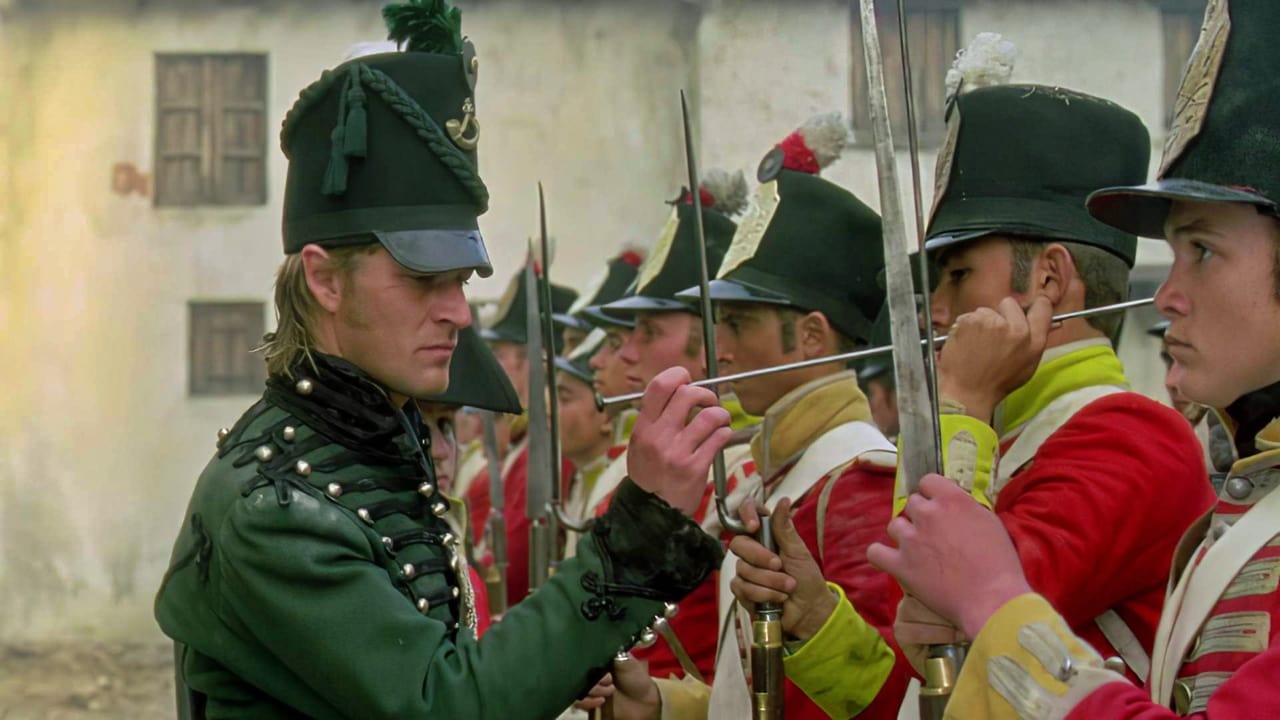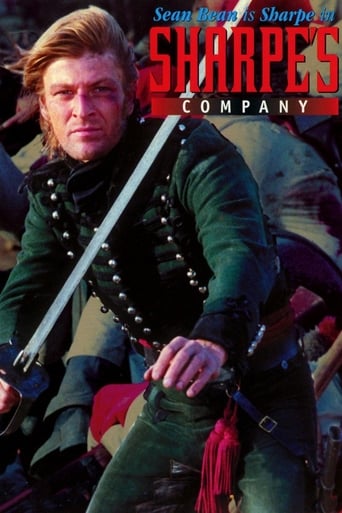

I regret that I must strike a discordant note here. All the other reviews of 'Sharpe's Company' are highly positive, but the film left me feeling uneasy.It certainly has many strengths. The photography is good, as are the action scenes. The period feel is effective, and the history accurate. Sean Bean provides an impressive screen presence, ably supported by a good cast.And yet...Several things stick in the gullet. How does the evil Sgt Hakeswill character get away with so much? Sharpe is an officer, and so can outrank him at every turn, but he only seeks to thwart Hakeswill from time to time, when it suits him. This allows Hakeswill to get away with - literally - murder, several times.Why didn't Sharpe make more effort to protect the charming and likable Sally Clayton (Louise Germaine)? Hakeswill made his designs on her clear from an early stage, but no-one stopped him raping and murdering her at the end.I realise that it is only fiction. Nonetheless, drama like this requires belief, empathy with the characters and a sense of poetic justice - and none of this was fulfilled by the Hakeswill parts of the plot.Allowing Hakeswill to get away with so much also resulted in enormous holes in the plot. Why was Hakeswill not punished for shooting the boy ensign in the back? There were no French around at the time whom he could have claimed to be shooting at, and the weapon used could be easily traced to him, as it was an unusual weapon used by very few.How did Hakeswill manage to rape and murder Sally Clayton when the camp would be full of other camp followers and sentries? Why didn't Sharpe chase after him after their fight in the city house at the end? (and thus prevent him from going on to commit the rape and murder). The film shows Sharpe giving up because a few redcoats were in the way - but they didn't stop him racing up to save his 'wife' moments before. He just barged them out of the way then - why not again?.Since Hakeswill was shot and wounded by Harper, why did the last scene of him by Sally Clayton's body - chronologically very shortly after - show him fully fit and unwounded? And so on.These aspects could easily have been resolved with a bit more thought and attention to detail - and a bit more compassion and desire for poetic justice from the writers.It may not have spoilt the film for the other reviewers - but it did for me.
... View MoreSean Bean returns as Napoleonic hero Richard Sharpe. This time the action takes place in 1812 around the historical Battle and siege at Badajoz.Sharpe has been demoted to no more than a quartermaster to make a place for an aristocratic fop who has bought Sharpe's captaincy of the light company at horseguards.Sharpe realises that there is only one act of bravery that will help him regain his captaincy and keep it, and that it to lead the the 'Forlorn Hope' the first company that will storm the walls of badajoz when the assault finally begins... in short a suicide mission.Sharpe also has personal reasons to get inside the city, and that is because his wife Teresa and his newborn daughter Antonia, are trapped inside and are in danger of being discovered by the French.Also to add to Sharpes worries, a demon from his past, Sergeant Obidiah Hakeswell has returned to the ranks and is determined to rape, pillage and flog as many people as possible.Pete Postlethwaite gives the performance of the movie as the evil, twitchy Obidiah, and the character of Patrick Harper is brought to the forefront a lot more and Daragh O' Malley really shines.Another great Swashbuckling Sharpe adventure
... View MoreSharpe's Company is arguably the best episode in the Sharpe series of movies and one of the few that can truly stand on their own regardless of whether you've seen the previous chapters or not. It achieves this largely because it ticks every box required to make a great Sharpe movie. Dastardly villains? Check. Dashing heroism? Check. Women in peril? Check. One almighty ruck at the ending in which hundreds of people die senselessly? Oh hell you'd better believe there's a check there.The story this time takes place not long after our hero captures the French Eagle at Talavera, a gap of several years in the books but mere months this time around. The English army are on the march and preparing for a full scale invasion of Spain, but before they can expand out of Portugal, they have to capture two French fortress cities on the border: Ciudad Rodrigo and Badajoz. Rodrigo is taken within the first five minutes and the rest of the running time largely concentrates on the siege of Badajoz with all the trials and tribulations the lads must endure before storming a breach in the walls for the pre-requisite big fight. And Sharpe is especially keen to get inside the city, because his wife Teresa is trapped inside with his eight month old daughter.From this premise, we get a gripping story of men at war. Cannon batteries rain shot after shot on the walls of Badajoz which slowly crumble over the days, while the soldiers sit around doing little but digging trenches and waiting for death to come. They face French excursions to steal their trenching equipment and boredom and while it does not dwell on the matter too much, there is a sense of frustrating tedium among them as the final assault approaches. Sharpe's desire to be first in the breach meanwhile and be promoted to captain does not get as much focus as it does in the novel and instead, the time between fights is concentrated mostly on his rivalry with Obadiah Hakeswill, the insane Sergeant who once had him flogged. Hakeswill is played by none other than Pete Postlethwaite, deviating from his usual father-figure casting by playing one of the most evil men Sharpe will ever meet. He is beset by facial twitches and has a rather perverse view on war and women, lusting after Teresa and tormenting the men in the ranks unless they let him rape their wives. Sharpe's abuse of Hakeswill could have seen him come across as a bit of a bully were it not for Postlethwaite's terrific performance and you can't help but wish he'd kick him around even more than he does, especially when Hakeswill engineers a situation that leads to Harper (Daragh O'Malley) being flogged.And then of course, there's Sean Bean. By this point, he was evidently very comfortable playing the title role and it's not surprising the series made him a star in England. He handles the action scenes like a pro but its in the quieter moments when he shines brightest, especially the elation that washes over him when he first learns of his daughter's existence.But when it comes down to it, what do we all want from the Sharpe series? That's right, battles. Great big ones where the Peninsular is turned into a charnel house filled with corpses and cannon smoke and Sharpe's Company delivers one of the biggest clashes that the South Essex ever gets involved in. With the fortress walls breached, hundreds of English soldiers charge in only to be torn apart by French muskets and cannon fire time and time again until only Sean Bean stands between victory and certain defeat? Can he save the day? Well...it's Sean Bean, what do you expect? In short then, in this humble writer's opinion the best entry in the series. It has everything you'd want from a Sharpe movie, blood, carnage, drama, romance, great big fights and good old Johnny Englishman giving the bally foreigners a damned good thrashing what? Oh and keep your eyes out for Marc "Been in Everything" Warren making a brief appearance as well.
... View MoreSharpe's Company really marked the beginning of what the series would become. It was bigger than the previous two entries, and everyone involved in the series seemed to be settling in. Sean Bean seemed to really slip into his own comfort zone with the character here, and Tom Clegg seemed to be comfortable as a Director as well. And Daragh O'Malley stepped right up and made Harper a major player in the franchise.I saw it mentioned in another review that Sharpe's Company is the one movie of the series that can really stand on it's own. I have to say, even though it's not my very favourite, I totally agree. This was my introduction to Sharpe, and it is the perfect place to start. In fact, I didn't even see the first 2 movies, Rifles and Eagles, until much later on. Maybe the reason why this is so good as a stand alone movie is because everything seemed to really begin here. Like I said, Company was the beginning of what the series would become. Rifles portrayed Sharpe as a very different character in very different circumstances. Eagles kind of set up him as a leader of the Riflemen. Here in Sharpe's Company, Sharpe has become a leader and has softened up a bit as a character. He's very trusting and sympathetic to his men, he takes the role as a mentor to a young boy, and he's about to become a father. But of course we still get several great scenes of Sharpe the arrogant bully, tormenting his enemy, Obadiah Hakeswill. The way Sharpe does torment Obadiah would normally set him up as a despicable guy in most movies, but thanks to Pete Postlethwaite's performance as Obadiah, you can't help but cheer Sharpe on as he constantly lays into him. And Pete Postlethwaite's performance is phenomenal. It's insane and mad, while just sitting on the right side of being over-the-top. Not many people can mumble their way through a movie and talk into their hat, and not be a laughing stock to the audience. Instead, Postlethwaite develops himself as a menacing villain. He's despicable and entertaining at the same time.The final siege is where Sharpe's Company really shines. Instead of filming it like an action piece, Tom Clegg directs the sequence in a very personal way. All you see for most of the Siege is close up shots of the Red Coats charging forward. Since he focuses right on the soldiers the whole time, the explosions and gunshots around have more effect. You're not seeing the enemy firing on them, so there's more suspense. It's a powerful sequence full of soldiers marching and dying right on camera. If it had been shot like most War movies, the scene would have no impact. To Tom Clegg's credit, not showing us a lot of the mayhem around is really what made the end of this so worth watching. And then of course there's the long awaited showdown between Sharpe and Obadiah (which is an especially long wait when you consider the India series that was never made into movies). Although it's brief, there's enough pure energy between Sean Bean and Pete Postlethwaite to end with a bang. I think it's unlikely that someone can watch Sharpe's Company and not enjoy it. I think it's downright impossible to watch Sharpe's Company and not be interested in seeing what happens next in Sharpe's Enemy. This movie was the perfect launching point for the series, and it sets up the next movie while still giving the audience closure. Every time I see the end of Sharpe's Company, I immediately make plans to see Sharpe's Enemy. I suggest everyone else check that one out as well.And a final message to Tom Clegg. If you're reading this, and you've never considered it, I urge you to get to work on a new Sharpe movie. PLEASE! There's still so much more to do.
... View More